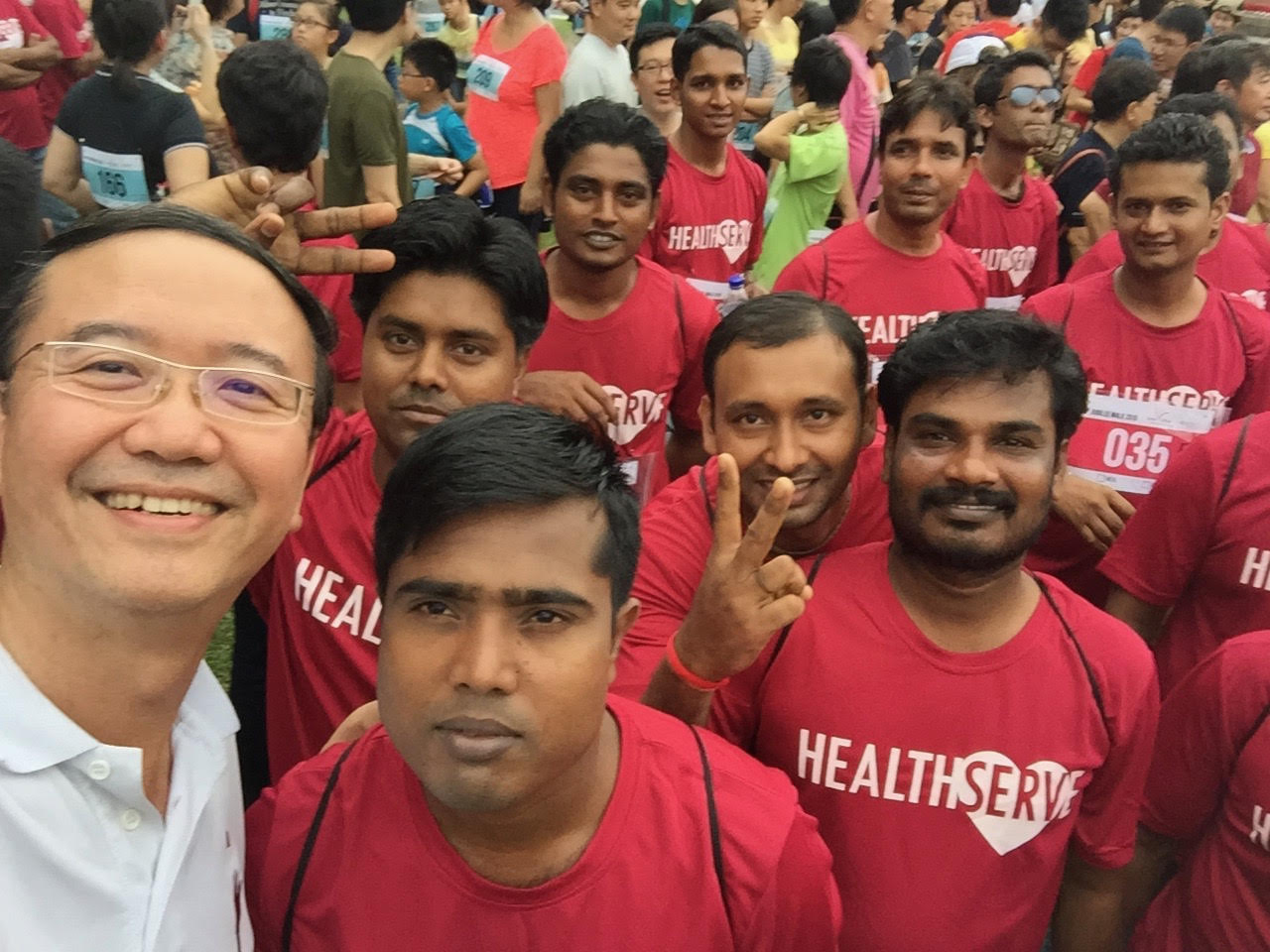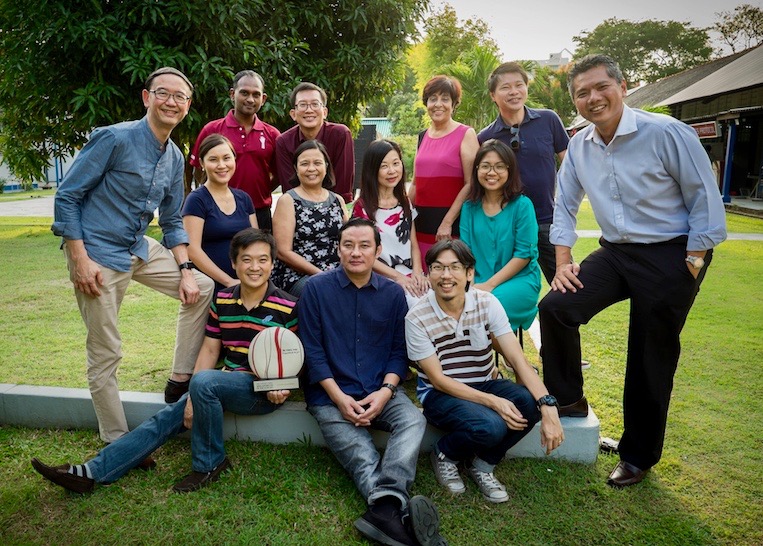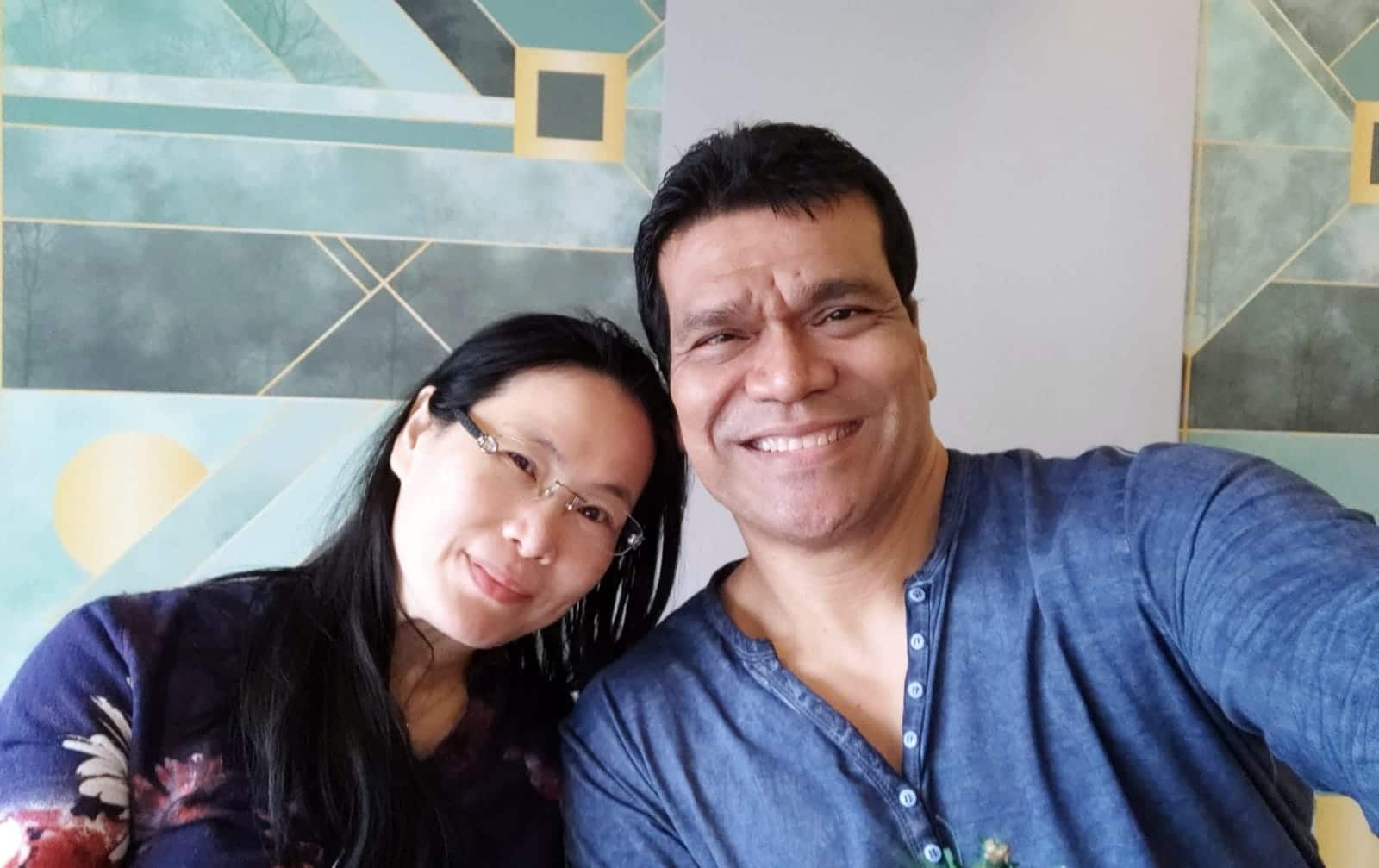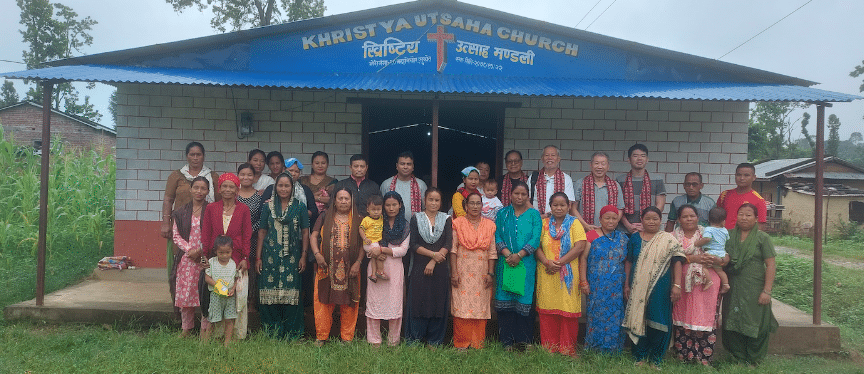“Singaporeans need to learn to live with mess!”: 2017 Singaporean of the Year Dr Goh Wei Leong
In celebration of our 54th National Day, Salt&Light brings you interviews with leaders who put Singapore on the map, not only as captains of industry, but as pillars of faith.
by Juleen Shaw // August 8, 2019, 7:10 pm

Dr Goh Wei Leong (left) with HealthServe friends. HealthServe began when Dr Goh asked himself: "How does my faith square up with issues of poverty, exploitation, social injustice?" Photos from healthserve.org.sg.
It is Tuesday.
So naturally an 8am text from Dr Goh Wei Leong reads: “G’morning from East Coast beach”, swiftly followed by a picture of a quiet stretch of sand, cotton-streaked sky, ships in the distance.
This is his Tuesday morning routine: Beach, Bible, prayer, reflection.
A picture of serenity.
By the time we meet for lunch, however, that solitary hour has been firmly shelved, set aside until next Tuesday.
By noon, it is time for meetings, consultations, ministry work, talks, appointments, crammed so tightly that, for this “wanted” man, a few hours spent ignoring his mobile devices subsequently means one full day replying Whatsapp messages and two days answering e-mails. And then 100 more arrive.
“This is why I don’t do social media … there is no time!” says the 2017 Straits Times Singaporean of the Year with a mock moan.

Dr Goh Wei Leong with his HealthServe team – “they do all the work, I just do the fun part, talking about it!”
He’s not kidding. While Dr Goh, 59, is best known for being the chairman and co-founder of HealthServe (a medical-social enterprise serving the migrant community), he is also highly involved with Operation Mobilisation (OM) (an international, interdenominational mission organisation), Christian Medical & Dental Fellowship (CMDF) (a national, evangelical fellowship of Christian doctors and dental surgeons), and Karunya Clinic in Little India.
An involved Katong Presbyterian Church elder, he is also a seasoned speaker/moderator at forums – just last week, he moderated a panel for the newly-launched Wordly Collective, which looks at artificial intelligence in missions.
(“Got to go now … Running around today having meetings with missionary data scientists!” reads his latest intriguing text.)
All this while running his medical clinic in the notorious Jalan Kukoh area.
Ask him what he’s up to, and the usual reply is: “Just one or two crazy things.”
Salt&Light sat down with Singapore’s Renaissance Man to find out exactly what those crazy things are and what he hopes to accomplish by them.
First off, is there a reason you famously share your 2017 Singaporean of the Year title with HealthServe?
The award came in early 2018 as HealthServe celebrated its 10th anniversary.
It’s really quite wonderful that the award was given to an organisation, not an individual. It’s given to a movement, a vision, a community.
We actually started HealthServe as a clinic, then added counselling services, social services, food projects, then research and advocacy – all of which are run by about 10 core fulltime staff and many volunteers, including housewives, students, doctors, lawyers.
They are the ones running it, I only do the fun part – talking about it!
What drove you to start HealthServe and your other enterprises?
If I show you my original HealthServe documents – how and why it started – it really had to do with my personal faith.
I was struggling with my faith … how does my faith square up with issues of poverty, exploitation, social injustice?
(In The Straits Times article, “Dr Goh Wei Leong switched from Maserati to charity after Mongolia trip”, he talks about how, for several years, he “lost the plot” to the lure of a “good life”.)
In 1995 I rediscovered Jesus when I went on a humanitarian trip to Mongolia. Life there was tough. There was a shift in my vision.
“With me, things often start with a crazy idea. But very often the crazy idea dovetails with a need that’s already there.”
Later I got involved with India OM on short-term missions. As you know, India is not the easiest place, and the hardship hits you. Soon I joined OM as a regular volunteer, and ended up chairing the Board.
On a medical mission trip, a friend and I came up with the idea of starting Linking Hands, an online registry for doctors to network and form global partnerships with medical missions. So the source and the needs are matched.
I started having missions parties in my house, collecting names and data of missionaries passing through Singapore. (In those days no PDPA, so no problem!)
In 2000-2006 there was a string of disasters – the 2004 tsunami, earthquakes in Turkey, Pakistan, Iran, Palembang, Padang … I was really busy with Linking Hands, which became a platform for aid agencies in Singapore like TOUCH International, Red Cross, World Vision. Our network grew to 65 countries.
When I was invited to run the Christian Medical & Dental Fellowship, I started sending students around the world for medical electives. I sent two to India in 2001, and within the next five years I was the medical electives guy!
Students and interns come back and become volunteers or run our programmes, so it becomes a long-term relationship.
Do you have ideas percolating at any one time?
With me, things often start with a crazy idea. (Laughs) But, you know what, very often the crazy idea dovetails with a need that’s already there.
My friends call me a serial entrepreneur! Starting stuff is my passion.
But when people ask me what I have in mind, I say: “I don’t know!” I have a rough idea of what my projects will look like but I’m fine living with not knowing for sure. I think not many people can take that!
Is there a common thread to your ideas?
Marginalised people. Bringing them into the centre of things.
If you’re a serial starter, how do you ensure that your projects are sustainable?
Young people! I cannot abide by running things with an old mindset … buay tahan!
Young people bring in ideas that are out of the box. I’m great friends with some of them – we may be of a different age group but we are like minded. At the get-togethers I organised, they said: “Hey I didn’t know there were other people who were interested in justice, in the poor.” And they started inviting their own friends. So our meetings became a very special place for like-minded people to spur one another on.
Can you describe a project that has embodied this ideal?
When I was invited to chair the 34th visit of Logos Hope, OM’s ship, to Singapore, I was one of the few people in Singapore at the time who thought the idea was outdated.
Yet when I was invited to chair, strangely I said yes. And I was so excited about it deep down inside, I didn’t know why.
“When I run a project, it is usually run on collective wisdom … We share resources, wisdom, people.”
I sent out an e-mail with a nice write-up calling for people to help. Twenty-three people came, HealthServe people, plus all kinds of millennials – we dubbed them the G23, as these 23 were the core group.
When I run a project, it is usually run on collective wisdom. Everybody comes together and thinks what to do, how to run it. We share resources, wisdom, people.
I accepted the role in August, the ship’s visit was planned for February – a runway of just six months. I was told: “Sorry ah, the ship is coming during Chinese New Year.”
I thought: “Siao liao. How do we do this, everything is closed.”
I told the G23: “Hey guys, the ship’s going to come during the first and second day of Chinese New Year.”
You know what the young people said? “Hey Dr Goh, wonderful! Everything is closed during first and second day of Chinese New Year and we are open!”
And they were right. We hit a record number of visitors during the first day. The programme they came up with was so innovative – instead of “International Night” (the world is now globalised, we don’t need another ethnic dance), we had breakout groups that discussed health and social justice, with Joseph Chean from YWAM as a speaker and Martin Tan from Halogen to chair the whole event. People were talking about it for a long time!
Is it possible for new ideas to break into traditional spaces, like churches?
Absolutely. My church, Katong Presbyterian, had to undergo renovation. So my pastor, Rev Lam Kuo Yung, and I talked about rethinking church from scratch … balik … go back to Acts 2.
We asked ourselves: So what is church in the 21st Century? And we designed the church with input from everybody – that’s the beauty of dialogue.
During the one and a half years of construction, we had different teams involved: A hospitality team, a creation care team, a creative arts team, and so forth. Our creatives art team looked into artwork for the church, and had seniors sewing art pieces.
Our creation care team got the architect to build the entire church office out of recycled church pews.
We even had a transition team, which was tasked to advise on the movement of our people during the construction. They said: We have three options; one, rent a hotel ballroom which costs about S$10,000 a month; two, rent facilities in a nearby school; three, we stay put in the construction site.
“During construction, the place was dirty and people were super inconvenienced. But we never grew more as a church.”
Their proposal was to stay put. Not only would we save money, they even gave a biblical basis for it: In the Old Testament, during the Feast of Tabernacles (Leviticus 23:33-43), the Israelites lived in temporary shelters (booths) for one week, and it helped to remind them that they (and we) are all pilgrims on earth.
They said: “Let’s experience some inconvenience!”
The whole committee liked this idea.
But can you imagine – during construction, we had zero carpark, the church office was in a container, and to walk to the main sanctuary, you had to pass through a narrow gap with two porta-loos. It was dirty and people were super inconvenienced.
But you know what? We never grew more as a church.
People started washing plates for each other, and saying, “Oh, you have no space for Sunday School? Here, share my space”. We learnt how to share, to be other-centred, to live with mess. We made friends with the construction workers who lived on the site, knew them by name and invited them for Christmas and other meals.
And when we moved into the new sanctuary, no one complained that this or that didn’t work, because we had all lived through the progress and we appreciated what we had.
My pastor started community potluck dinners with no agenda, inviting people in the neighbourhood. We needed to understand that church is very dynamic.
So our building is a reflection of our values. In July last year, 250 people moved into our church from another church. We put it to a vote – you know, Presbyterian lah – and 94% of our congregation said ‘yes’ to another church using our brand new building! Can you beat that? I was so pleased because I think the values had been absorbed.
So do you think Singaporeans need to learn to live with mess?
Yes! Ab-so-lute-ly!
(In an interesting parallel, Dr Goh’s pastor, Rev Lam Kuo Yung, writes:
“The usual Singaporean ethos for running a programme is efficiency. Because we are busy and practical people, we want to get things done within the shortest time and with the smallest budget.
“Unfortunately, things done this way will only train people to be Singaporeans, not Christians.
“Running programmes for Christ requires deep reflection on our Christian ethos. Only when the organising process reflects our Biblical beliefs and values will we be spiritually formed and transformed as we work together.”)
Did you ever have to deal with conflict?
Actually a lot of change started with a major blowout which threw the church into crisis. The crisis led us to think about what we are about, our values. Now we think that crisis was almost inevitable for our growth.
The church elders began to meet to pray because of that crisis. It’s been 10 years now and every Saturday, all the elders, past and present (12-15 of us), still meet at my house for morning prayer and Bible study, followed by breakfast.
As a result of the bonding and fellowship, our monthly board meetings are a breeze!
It’s a relationship framework; the transactional falls under the relational.
How do these ideas about church dovetail with your ethos for Singapore?
On National Day, one year before Singapore’s Jubilee in 2015, I had 40 people over to my house. We asked each other: What should be a Christian’s response be to the Jubilee?
That was the genesis of Team Zero – “zero” because Jubilee is about resetting. How do we go back to zero? We also wanted to “zero in”, be very focused about what we wanted to do.
So in the next one year, we held seven different talks on issues such as inequality, poor, migrant workers, law and justice.
One of the talks was about what God was doing among the local poor. I brought the team to Jalan Kukoh. My friend, Pastor Andrew Khoo, runs New Hope Community Services and we met at his void deck.
Dr Lai Pak Wah gave a talk about church history and poverty – right there in one of the poorest parts of Singapore – after which we had breakout groups which met at the basketball court, the HDB stairwell … and finally we did our debrief at the empty hawker centre. It was very powerful.
Team Zero carries on now in various forms, including Micah Singapore, which champions justice issues, and Church Reform, which includes the Urban Shalom series.
Do you ever have doubts over your innovative ideas? Where do you get such conviction?
I always start with people. My work is always collaborative, so if we fail we fail together, if we succeed, we also succeed together!
In everything I’ve started, I always try to be a reflective practitioner.
What’s your secret to fitting so much into 24 hours?
Attentive presence. However, now I’m talking to you, at the same time I’m thinking this salmon is probably farmed and we’re killing the local ecosystem, and I’m noticing the baby crying at the next table … That’s the way I’m wired, I have a matrix mind but it’s very luan lah!
With my life so full, I enjoy my quiet moments, like long plane rides.
Do you have a verse or Bible tenet you hold on to whenever you launch something?
For me, love binds everything, as John 13:34-35 says:
A new command I give you: Love one another. As I have loved you, so you must love one another. By this everyone will know that you are my disciples, if you love one another.
For my medical work, it’s Jeremiah 9:23-24. God says: I don’t want all these – strength and riches and talk about tithing – I’m concerned about the weighty issues, the issues of justice.
I see God working in all of these different projects.
So God surprises you?
All the time! (Laughs and slaps the table gleefully.)
“No one gives you tuition on what to do in Parliament!”: Kuik Shiao-Yin on taking risks for God
We are an independent, non-profit organisation that relies on the generosity of our readers, such as yourself, to continue serving the kingdom. Every dollar donated goes directly back into our editorial coverage.
Would you consider partnering with us in our kingdom work by supporting us financially, either as a one-off donation, or a recurring pledge?
Support Salt&Light


